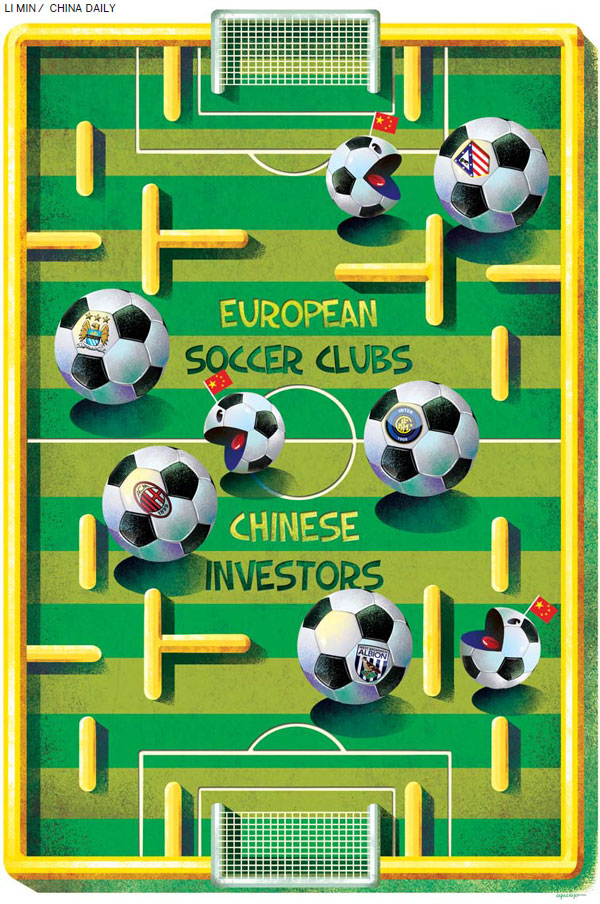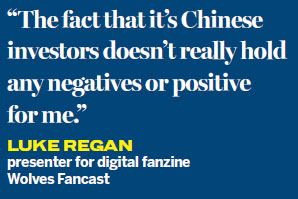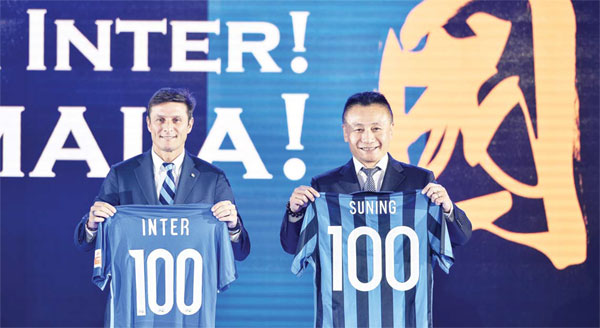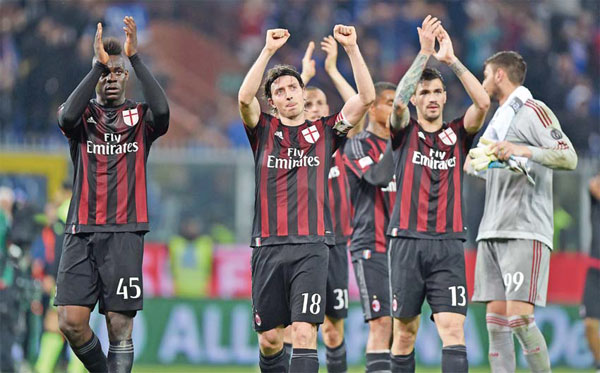Net gains
Updated: 2016-08-12 07:54
By Angus McNeice in London(China Daily Europe)
|
|||||||||
Chinese investment in European football clubs will be a learning experience, for owners and fans
The sale of a club is a nervy time for a football fan. Will the new owner pump money into the team and propel it to unprecedented heights, or will they load the club with debt? Are they level-headed businesspeople with a passion for the game, or flashy millionaires after a new toy?
The worry is compounded when the new owner comes from a country without much of a footballing tradition, and is presumed to have little knowledge of the game.

Europe's clubs are no stranger to foreign investment. Qatari, American and Russian billions have transformed teams across the continent. Indeed, no domestically owned club has won the English Premier League in the past 12 years. All the while the Chinese were notably absent.
Times have changed.
On Aug 4, West Bromwich Albion fans went to bed frustrated. A 16 million pound ($20.9 million; 18.7 million euro) deal for Senegalese striker Diafra Sakho had crumbled at the 11th hour, and supporters wondered how much improvement was in store for a squad that finished 14th in the Premier League last season. They woke up the next day to discover the club was under new ownership after being taken over by a consortium led by Chinese entrepreneur Lai Guochuan.
The AC Milan faithful also breathed a sigh of relief on Aug 5 as the drawn-out saga of the Italian club's sale by former Italian prime minister Silvio Berlusconi's Fininvest to a consortium headed by Li Yonghong came to an end.
A Chinese consortium has signed a preliminary deal for a 99.93 percent stake of AC Milan, according to Fininvest. The agreement values AC Milan at 740 million euros ($825 million), including an estimated debt of approximately 220 million euros. The agreement requires the Chinese investors to spend 350 million euros over three years to improve AC Milan's financial structure.
The deal also requires the investors to deposit 100 million euros to confirm the commitment.
The final contract will be completed by the end of the year, subject to the obtaining of authorizations from Italian and Chinese authorities.
The ink has barely dried on both contracts, but fans are aware that the summer transfer window slams shut in a few weeks and are eager to know the new owners' vision for the future. If they look across Europe for reference points as to how Chinese-owned clubs are running, they will be encouraged and dismayed in equal measure.
The first high-profile Chinese investment in European football came with Wanda Group's purchase of a 20 percent stake in Atletico Madrid in January last year. Chinese investors have since snapped up minority or majority stakes in Inter Milan, Manchester City, Aston Villa, Wolverhampton Wanderers, Espanyol and Sochaux, among others.
China had dipped its toe in the waters of the European football market the year before, in the unlikely location of The Hague. In 2014, businessman Wang Hui of United Vansen Sports arrived in the Netherlands and bought middling Eredivisie club ADO Haag for a reported $8.9 million.
"The fans were saying he's the new Abramovic. He's going to come here with a wheelbarrow of money, he's going to buy Messi or Ronaldo," says Marc, editor of the club's oldest supporter website, ADO Fans, referring to Roman Abramovic, the Russian billionaire who owns Chelsea FC. "That was never his intention." Marc asked to be identified only by his first name.
Wang initially had the fans' support. He regularly attended games, was pictured training with the squad, and spoke openly about lifting one of the country's oldest clubs from mid-table obscurity.
The honeymoon didn't last long. The money to buy the team arrived a few months late, but it did arrive in the end, along with firm deadlines for further investments. Club officials made public that Wang was late on several payments, and he was widely criticized in the Dutch media.
"He promised some money," says Marc. "It was an oral agreement, and the management of the club was foolish. ADO spent it before they had it and then accused Wang of not paying his dues, and he got angry saying, 'Don't insult me in public. If there's something, call me.'"
Wang cut off contact with the club's management. Marc says both club and owner began with the best of intentions, but a culture clash led to a serious breakdown in the working relationship.
ADO fans have a fearsome reputation for including some of Europe's worst hooligans. Yet the club has maintained strong links with the area's predominantly white, working-class population.

"The biggest problem was the cultural differences and the way they spoke to each other," Marc says. "Wang didn't respond to calls or emails because he was insulted. In China, the boss is the boss. It's different for us. He heard a lot of people around the club insulting him and that did a lot of damage."
ADO got in a new general manager with previous experience of working in China and the lines of communication were eventually improved. Wang watched the club win a preseason game recently, and last month he met with fan representatives.
"The relationship has normalized," Marc says. "Everyone knows his intentions. He wants ADO to get to a higher level, but he also wants to bring knowledge of the European game back to China. China's President (Xi Jinping) wants to improve Chinese football, and the only way is by getting knowledge from Europe."
In England, a new Chinese owner's honeymoon period is underway. Tony Xia, the chairman of Recon Group, purchased relegated Midlands club Aston Villa in June for a reported 76 million pounds. His approach is in stark contrast to that of perpetually silent former owner Randy Lerner.
Xia interacts directly with fans on Twitter, confirming transfers, dispelling rumors, and he even responded to a request for a junior kit from an expecting mother. Although, sometimes, his language is not so family friendly.
He described Ian Holloway as a "failed player, failed manager and now (expletive deleted) pundit" when the Sky Sports analyst predicted Villa would finish this season 16th in the Championship, the second-tier of English football.
"We've been crying out for some visual leadership," says Howard Hodgson, director of the Aston Villa Supporters Trust. "So some of what Xia's done is great. It's questionable whether it's professional, but equally it's endeared him to supporters. Personally, I think he's asking for trouble, but the fans are loving it."
But he says fans may quickly turn on Xia if he fails to deliver on the investment he's promised - between 30 million and 50 million pounds.
"Have we seen that yet? No. I think our net spend so far is about 7 million pounds. So it's been nothing spectacular," Hodgson says. "He's quite an unknown. He isn't on any Forbes or Chinese rich list, so this isn't a Wanda, this isn't Jack Ma (chairman of internet giant Alibaba Group).
"Some of his statements when he first bought Villa - saying he wanted to make it one of the top three clubs in the world in 10 years - are great to hear and extremely ambitious, but at the moment the fans just want to see some pride restored and the club back in the Premier League."
In nearby Wolverhampton, fans believe their local club has a Chinese owner that will walk the walk. Billionaire Guo Guangchang's conglomerate, Fosun International, paid a rumored 45 million pounds for Wolverhampton Wanderers in late July.
Fosun's representative on the board, Jeff Shi, spoke plainly about the company's funds on Aug 8. "Our capacity for investment is huge," he said. "Any investment in the club will not be a problem for us."
Luke Regan, a presenter for digital fanzine Wolves Fancast, says supporters are reassured that the new ownership is a wealthy business collective, rather than one individual with his finger on the button.
"The fact that it's Chinese investors doesn't really hold any negatives or positive for me," he says. "It's more a matter of who it is rather than where they are from. They seem to be well funded, you obviously get the sense that they are not doing this for a laugh."
Across Europe, Chinese owners continue to succeed and weather criticism. Fans of Espanyol, which is owned by Rastar Group, are hugely positive about the appointment of popular manager Quique Flores as well as the retention of their club captain after a substantial outside bid.
Slavia Prague fans have welcomed new owner CEFC China Energy Co's investment in its stadium and were thrilled when the club stole a striker from crosstown rival Sparta Prague.
Meanwhile, Ledus Chairman Amos Li Wing-sang, the owner of French Ligue 2 side Sochaux, received a stinging letter early this year from the fans, denouncing him for a lack of vision and for treating the club as a financial instrument.
As Chinese investors enter new territory in Europe, Regan says they must recognize that while professional football clubs are businesses, the fans don't like to be treated like consumers.
Respecting tradition and history is paramount.
angus@mail.chinadailyuk.com
|
Suning Sports Group Vice-President Gong Lei (right) and Inter Milan Vice-President Javier Zanetti hold team jerseys in Nanjing, capital of East China's Jiangsu province, on June 6. Chinese retail giant Suning Group acquired a 70 percent stake in Italian football club Inter Milan in a deal worth 270 million euros. Li Xiang / Xinhua |
|
AC Milan's players celebrate success after a match. The Italian club was purchased by a Chinese conglomerate this month. Provided to China Daily |
(China Daily European Weekly 08/12/2016 page1)
Today's Top News
Aviatrix bids to become first Chinese woman to fly solo round the world
Xi to attend, chair G20 summit in Hangzhou
Chinese investment in European football
Myanmar's Suu Kyi to visit Beijing
Ukraine denies attempted troop invasion of Crimea
Solidarity called to firefighters facing wildfires
Eurostar train staff to strike for seven days: UK union
Trump's gun rights comments ignite firestorm
Hot Topics
Lunar probe , China growth forecasts, Emission rules get tougher, China seen through 'colored lens', International board,
Editor's Picks

|

|

|

|

|

|









